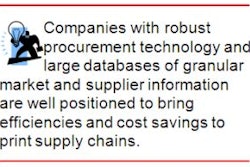
That's the view of Andrea Robinson, business development manager for the U.K. for CargoWise, a technology supplier for logistics service providers.
"Logistics service providers are working with an ever-changing array of global trading partners, regulations, business requirements, risk management concerns, cost control issues and competitive objectives," says Robinson. "They also continue to be affected by volatility in the lackluster global economy. Yet, despite these challenges, even in our Internet world, many businesses are still not implementing the advanced, corrective IT solutions that will enable them to effectively deal with today's global supply chain management challenges."
Robinson asserts that the inability to embrace modern technology is having a dramatic impact on many of these companies, which are often stagnating because they are relying on incremental increases in existing customer volumes and close business partnerships to survive rather than using advanced, flexible technologies to attract today's new tech-savvy customers who demand greater supply chain visibility.
Robinson suggests five areas where IT solutions can optimize global supply chain management:
Partner Collaboration. In a global economy, strong partner relationships and collaboration are crucial to all logistics organizations and their partners. Fragmented functionality cannot be tolerated within the successful supply chain; rather, partners should be working closely with one another on a fundamental level to ensure the success of the supply chain partnership.
Clear, Concise Communications. Utilizing a single automated database ensures that trading partners can communicate in a compatible language with other companies to identify common key performance indicators (KPIs) that provide a level of integration for shared systems and processes. To achieve this goal, service providers must stay tuned into their customers' needs and learn to react more clearly and concisely on a real-time basis to changes within the global landscape. The successful outcome of this builds trust and develops new, longer lasting profitable business by providing a competitive advantage through service enhancements.
Process Improvement. It is especially important in today's volatile economic environment that LSPs evaluate the manner in which they conduct business via a robust change management process. This evaluation should examine not only management processes but legacy IT infrastructures. It may well be necessary to upgrade and implement new software technology that supports today's global market demands. The right software platform is crucial to avoid economic stagnation and improve partner relationships while cutting costs, ensuring growth and realizing increased ROI.
Invest Wisely in IT. While there is an array of supply chain best practices available today, some can be ineffective if companies don't select the IT solution that best suits their specific supply chain requirements as they relate to customer requirements. This includes implementing the technology needed to gather real-time data from the supply chain process itself. A thorough evaluation of operational goals, budget considerations and other relevant factors is critical in determining the most effective approach to regaining control over operating procedures and providing customers with the visibility and service they require. It also minimizes internal risk and enhances ROI.
Manage Metrics. Proper investments in IT solutions provide opportunities to review your processes and practices, and also to implement better administrative resources and skills, ensuring a successful delivery of services to customers and prospects. This helps create a more personal partnership, builds stronger relationships and enhances the ability to work toward common KPI's through an integrated logistics system.
"Ideally involving all trading partners with a common, integrated and distinctive IT application provides greater control of the global logistics process," summarizes Robinson. "The newer, integrated software technologies offer LSPs and their customers greater visibility into the global supply chain, while reducing operational costs, streamlining operations and enhancing processes. The traditional paradigm of 'plug and play' for software systems is no longer adequate to deliver today's necessary logistics solutions. Today's complexities and diversities require LSPs and the companies that rely heavily on IT system providers to deliver a clear vision of management resources necessary to optimize supply chain management with a competitive advantage."
















